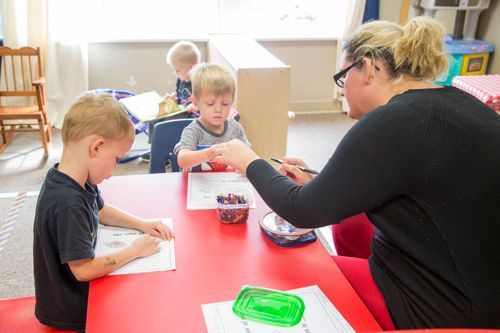Simplified: Embe received a $200,000 Bush Foundation grant to pilot a new program that lets daycares find substitutes to fill last-minute staffing needs via software. It's taking a page out of the gig economy playbook in a structure not seen anywhere else in the midwest, officials say.
Why it matters
- Childcare is the "workforce behind the workforce," said Jennifer Hoesing, chief development officer for Embe.
- Daycares have also seen the same staffing challenges as many other Sioux Falls businesses during the pandemic. It was through looking at those challenges this pilot program was developed.
- The shared substitute program – which is still in development – gives daycares a way to find workers while also bringing childcare into the gig economy by giving workers flexibility to choose when and where they want to go.
"The need is significant ... we're constantly, daily dedicated to finding substitutes to maintain our services," Hoesing said.
What's the backstory?
The collaboration between daycares to solve staffing needs was born out of conversations with Sioux Falls Thrive – a nonprofit focused on helping kids get what they need to be successful.
- Those conversations ultimately led Embe to apply for the Bush Foundation grant.
The $200,000 grant, which Embe received in December, was specifically intended to help an organization think outside the box to make a change in the community.
- For Embe and its partner daycares, the challenge – exacerbated by the pandemic – was staffing.
"Our thought was, how do we find a different kind of employee," Hoesing said.
What does the pilot program look like?
It's still in development, but the basic structure is in place. Essentially, it'll have the following elements:
- Four Sioux Falls childcare facilities, with the option to expand further after the six-month pilot. The initial four are Embe, Boys & Girls Club, Volunteers of America and Peace Lutheran.
- A software that allows daycares to post openings.
- An option for workers to send a "counter offer" to the openings. (For example: Someone could respond to a full 8 a.m. to 5 p.m. shift opening and offer to work 8 a.m. to 3 p.m. instead.)
- Workers in the substitute pool undergo the same training and vetting as any other childcare provider.
It's also unique to see the daycare industry using technology and flexible work in this way at all.
"When we talk to software management companies, they've heard of maybe one or two childcare programs (nationwide) trying to do this," said Denice Dengler, a consultant with Embe hired to implement this program.
What happens next?
The goal is to launch the pilot program in early December, Dengler said.
Before that, they need to find between 30 and 35 substitutes to build out the pool of candidates using the software.
- To do that, they're looking at recruiting people like high school or college students, retirees, stay-at-home parents, anyone who might have a love for children and some free time.
If the pilot program is successful, Dengler said the plan is to open the substitute pool up to more providers after six months.


